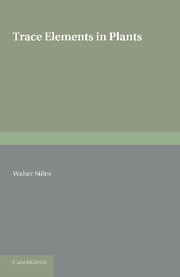Book contents
- Frontmatter
- Dedication
- Contents
- Preface
- Preface, to the First Edition
- List of Plates
- List of Abbreviations
- I HISTOBICAL INTRODUCTION
- II METHODS OF INVESTIGATING MICRO-NUTRIENT PROBLEMS
- III TRACE-ELEMENT DEFICIENCY DISEASES OF PLANTS
- IV THE EFFECTS ON PLANTS OF TRACE-ELEMENT EXCESS
- V FACTORS INFLUENCING THE ABSORPTION OF TRACE ELEMENTS AND THEIR EFFECTS ON PLANTS
- VI THE FUNCTIONS OF TRACE ELEMENTS IN PLANTS
- VII TRACE ELEMENTS IN PLANTS IN RELATION TO SOME DISEASES OF GRAZING ANIMALS
- VIII CONCLUDING REMARKS
- List of Literature
- Index
VII - TRACE ELEMENTS IN PLANTS IN RELATION TO SOME DISEASES OF GRAZING ANIMALS
Published online by Cambridge University Press: 05 June 2016
- Frontmatter
- Dedication
- Contents
- Preface
- Preface, to the First Edition
- List of Plates
- List of Abbreviations
- I HISTOBICAL INTRODUCTION
- II METHODS OF INVESTIGATING MICRO-NUTRIENT PROBLEMS
- III TRACE-ELEMENT DEFICIENCY DISEASES OF PLANTS
- IV THE EFFECTS ON PLANTS OF TRACE-ELEMENT EXCESS
- V FACTORS INFLUENCING THE ABSORPTION OF TRACE ELEMENTS AND THEIR EFFECTS ON PLANTS
- VI THE FUNCTIONS OF TRACE ELEMENTS IN PLANTS
- VII TRACE ELEMENTS IN PLANTS IN RELATION TO SOME DISEASES OF GRAZING ANIMALS
- VIII CONCLUDING REMARKS
- List of Literature
- Index
Summary
IN some instances deficiency or excess of an element in the plants eaten by herbivorous animals may cause grave disorders in the animals concerned. Deficiency of any essential element will, of course, induce pathological effects, while practically any trace element may produce poisoning if administered or presented to the animal in too great excess. But a few disorders traceable to mineral deficiency in pasture plants, or to excess of certain elements in the herbage eaten by livestock, call for particular mention in an account of trace elements in plants. A deficiency disease is caused by shortage of cobalt in herbage; diseases due to excess of a mineral constituent in the herbage are those in which the pathological effects result from a high proportion of selenium or molybdenum in the pasture plants. For a general account of mineral deficiencies and excesses in pastures in relation to animal nutrition reference may be made to a monograph on the subject by Russell (1944).
DISEASES DUE TO TRACE-ELEMENT EXCESS
Alkali disease (selenium poisoning). For many years a disease affecting horses, cattle, pigs and poultry has been known to occur in certain areas of the great plains of the Middle Western United States. The symptoms of the disease include loss of hair from the mane and tail of horses, from the switch of cattle and from the body of pigs, and a marked change in the growth of the horn of the hoof in all these animals which, when severe, results in the sloughing of the hoof. General loss of condition involving emaciation and listlessness may follow, and in the worst cases the animals may die. There may be lesions in various internal organs, including the heart, liver, spleen and kidneys. With affected poultry eggs do not hatch. Further, the symptoms can develop in animals in non-affected areas when fed with hay or grain produced in the affected areas. Because of the popular opinion that these effects were due to alkali in the water drunk by the animals, the disease was generally known as ‘alkali disease’, but nearly fifty years ago careful work by Larsen, White and Bailey (1912, 1913) showed that this conclusion was false and the cause of the disease must be sought elsewhere.
- Type
- Chapter
- Information
- Trace Elements in Plants , pp. 180 - 194Publisher: Cambridge University PressPrint publication year: 2013



